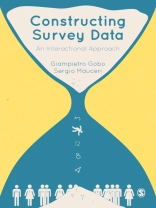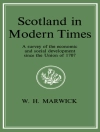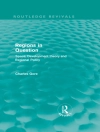Engaging and informative, this book provides students and researchers with a pragmatic, new perspective on the process of collecting survey data. By proposing a post-positivist, interviewee-centred approach, it improves the quality and impact of survey data by emphasising the interaction between interviewer and interviewee. Extending the conventional methodology with contributions from linguistics, anthropology, cognitive studies and ethnomethodology, Gobo and Mauceri analyse the answering process in structured interviews built around questionnaires.
The following key areas are explored in detail:
- An historical overview of survey research
- The process of preparing the survey and designing data collection
- The methods of detecting bias and improving data quality
- The strategies for combining quantitative and qualitative approaches
- The survey within global and local contexts
Giampietro Gobo, Ph.D., is Professor of Methodology of Social Research and Evaluation Methods at the Department of Social and Political Studies – University of Milan. He has published over fifty articles in the areas of qualitative and quantitative methods. His books include Doing Ethnography (Sage 2008) and Qualitative Research Practice (Sage 2004, co-edited with C. Seale, J.F. Gubrium and D. Silverman). He is currently engaged in projects in the area of workplace studies.
Sergio Mauceri, Ph.D., is Lecturer in Methodology of Social Sciences and teaches Quantitative and Qualitative Strategies of Social Research at the Department of Communication and Social Research – University of Rome ‘La Sapienza’. He has published several books and articles on data quality in survey research, mixed strategies, ethnic prejudice, multicultural cohabitation, delay in the transition to adulthood, worker well-being in call centres and homophobia.
Cuprins
Introduction: Rescuing the survey
PART ONE: THE CONTEXT
Surveying the Survey: Back to the Past
The Making of the ′Survey Society′: The 19th Century
The Common Roots of the Survey and In-depth Interview
The Pioneers: 1880 – 1935
Technical Improvements and the Abandonment of Mixed Methods
The Idea of Standardizing the Survey Interview
The Split between Quantitative and Qualitative Methods
The Explosion and Institutionalization of Surveys
Technical Modifications toward a Standardized Interview
The Decline of the Concern for Data Collection
The Globalization of the Survey Culture Model
Concluding Remarks
Back to the ′Golden Age′: Towards a Multilevel Integrated Survey Approach
What is Survey Research?
From the Standard to the Multlievel and Integrated Survey Approach
Concluding Remarks
PART TWO: FROM QUESTIONS TO ANSWERS
The Answering Process
What Lies Behind the Datum?
The Co-construction of Survey Data
The ′Cognitive Turn′ and the CASM Movement
Inference Procedures
Situation Awareness
The Limits of the ′Cognitive Turn′ and Social Information Processing (SIP)
From Cognition to Interaction: The Pragmatic Turn
The Logic of Conversation
Concluding Remarks
Asking and Questioning
Attributing Meanings to Questions
Evaluation: The Heuristics of Judgement
An Alternative Typology: Cognitive Tasks and Response Alternatives
Concluding Remarks
Answers: Cognitive Processes
Open-ended or Closed-ended? Facing the Dilemma
Scalar Answers
The Influence of the Response Alternatives
The Pragmatics of Response Alternatives
Response Alternatives and Linguistic Communities
Researchers versus Interviewees? Towards a Reconciliation of Separate Worlds
Concluding Remarks
Communicative Processes
Psychological States of Interaction
Social Conventions
Answers and Interviewees′ Demographic Characteristics
The Setting
Concluding Remarks
The Living Questionnaire: The Survey at Work
The Initial Contact with Interviewees
The Nonresponse Phenomenon
The Sociology and Psychology of Nonresponse
The Questionnaire in Action
Incongruences in the Answers
Concluding Remarks
PART THREE: CONSTRUCTING ANSWER COMPARABILITY
From Standardization of Stimuli to Standardization of Meanings: The Interactional Survey Approach
The Behaviourism-based SSA: The Standardization of Stimuli
The Interactional Survey Approach: Standardizing Meanings
Bridging the Gap between Questionnaire (Researcher) and Interviewee: Empowering the Interviewer
Standardizing the Meaning of Response Alternatives Too
Concluding Remarks
Training for the Interactional Survey Approach
Motivating the Interviewee by Following the Norms of Conversation
The Interviewer′s Hermeneutic Role
The Specific Hermeneutic Competence of Interviewers
Evaluation of Interviewer Performance
Concluding Remarks
PART FOUR: DESIGNING DATA QUALITY THROUGH MIXED STRATEGIES
Re-conceptualizing Data Quality
What is Data Quality?
Dimensions of Data Quality
From Data Quality to Survey Quality
Concluding Remarks
Mixed Survey Strategies: Quality in the Quantity
What is Mixed Methods Research?
Mixed Strategies: The Proportion of Quality and Quantity in a Research Design
The Integrative Role of Qualitative Procedures in the Survey: A Typology
The Pilot Study: Orientation of the Data Construction Process
Concluding Remarks
Pretesting Strategies: Assessing Data Quality in Advance
Aims of Pretesting
Pretesting Strategies based on Manifest Evidence
Qualitative Strategies: Inside the Black Box to Discover the Hidden Biases
Concluding Remarks
Deviant Case Analysis: Improving Data Quality
The Limitations of Monitoring Techniques within the Data Matrix
Deviant Case Analysis (DCA): The Exception that Refines the Rule
The Functions of Deviant Case Analysis
Exploring Deviant Cases: Some Techniques
Concluding Remarks
PART FIVE: ENVISIONING THE FUTURE
Glocalizing the Survey
Towards Multicultural Methodology
The Global Survey and its Discontents: The Limits of Current Survey Methodology
An Individualist Social Philosophy
Western Tacit Knowledge Embedded in the Survey Model
Lessons Learned from Cross-Cultural Surveys
De-colonizing the Survey
The Local Structural Context
Combining Global and Local
Brand New: Re-Styling the Survey
Concluding Remarks
Despre autor
Sergio Mauceri, Ph.D., is Lecturer in Methodology of Social Sciences and teaches Quantitative and Qualitative Strategies of Social Research at the Department of Communication and Social Research – University of Rome ‘La Sapienza’. He has published several books and articles on data quality in survey research, mixed strategies, ethnic prejudice, multicultural cohabitation, delay in the transition to adulthood, worker well-being in call centres and homophobia.












